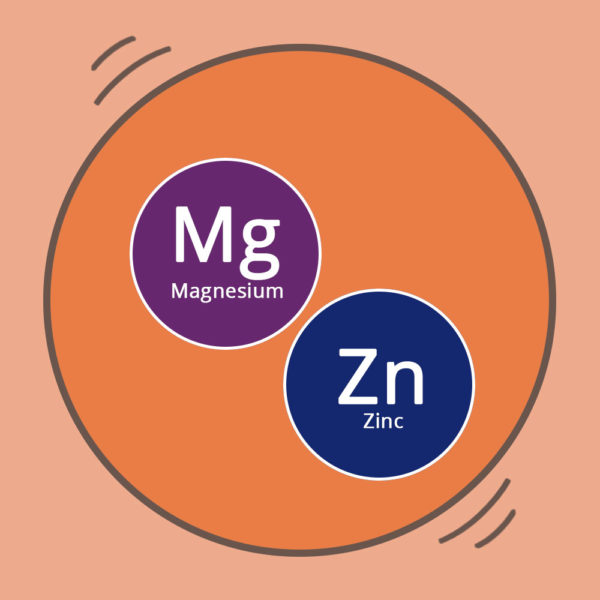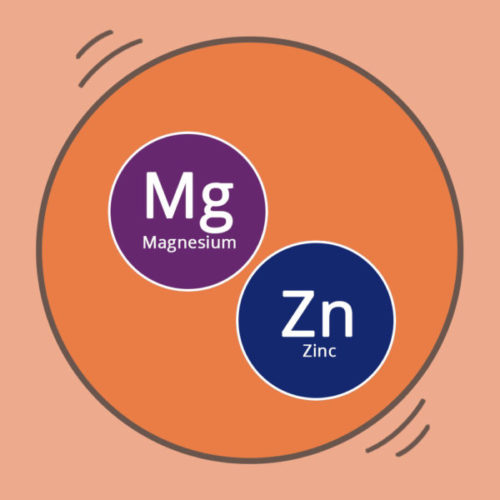The link between zinc and magnesium

Our bodies need many nutrients, vitamins, and minerals to function properly. Once they're inside, they all work together in different biochemical processes. One of the most crucial interactions is between zinc and magnesium.
What is zinc?
Zinc is an essential trace mineral that our body can't produce or store for very long. That's why getting a consistent supply of zinc from your diet or through supplementation is important.
This mighty mineral plays a role in over 300 enzymatic reactions in the body, including:
- Gene expression
- Immune function
- Detoxification processes
- Protein and DNA synthesis
- Wound healing
- Growth
What is magnesium?
Magnesium is another important mineral for your overall health. Around 60% of this mineral is found in your bones, with the other 40% in muscles, soft tissues, and fluids.
Magnesium plays a major role in being a cofactor (helper molecules) in various biochemical processes that occur in the body. Some examples include:
- Helping convert food into energy
- Using amino acids to create new proteins
- Helping create and repair DNA and RNA
- Involved in the contraction and relaxation of muscles
- Helping with regulating neurotransmitters
How do magnesium and zinc work together?
Magnesium and zinc are known to complement each other in the body. In fact, these two minerals work so well together that many supplements combine the two. The two minerals interact in your digestive tract and impact your body's ability to absorb the nutrients from them. Specifically, magnesium is known to regulate the amount of zinc in your body, and zinc encourages efficient magnesium absorption.
Magnesium and zinc deficiencies
According to Health Canada, adult Canadians need a daily intake of 320 to 420mg of magnesium per day and 8 to 11mg of zinc per day.
It's important to note that taking too much supplemental zinc can affect the absorption of magnesium and lead to a deficiency in magnesium as a result. Being low on magnesium can contribute to migraines, high blood pressure, heart palpitations, anxiety, infertility, and muscle cramping. That's why it's important to make sure you're getting enough, either through your diet or through supplementation.
A severe deficiency in zinc is rare since most regular diets provide sufficient amounts. However, there are certain groups of people who are more prone to an extreme zinc deficiency than others. This includes those with rare genetic mutations, breastfeeding infants whose moms do not have enough zinc, those with alcohol addictions, and those taking immune-suppressing medications. Not having enough zinc can impair growth and development, delay sexual maturity, cause skin rashes, chronic diarrhea, and improper wound healing.
But, following a healthy and nutrient-rich diet can help prevent magnesium and zinc deficiencies. If you believe you may be low on zinc and magnesium, you can also try taking a supplement that combines the two minerals.
What are the benefits of taking magnesium and zinc together as supplements?
Zinc and magnesium support each other's roles in our bodies. They simply work better together. Taking zinc and magnesium together may help:
Elevate your mood
Both zinc and magnesium are essential for brain signals and processes, which is why they may help elevate your mood. Studies have shown that magnesium may reduce symptoms of anxiety and people who met the daily recommended intake of zinc were 26% less likely to have depression.
Strengthen your immunity
Magnesium and zinc may contribute to reducing inflammation and boosting your immune system. This is because magnesium supplements have been shown to reduce C-reactive protein (CRP), a marker of inflammation. Taking magnesium with zinc may help with strengthening your immune system since zinc plays a major role in the development and function of immune cells.
Control blood sugar levels
Additionally, zinc and magnesium may help with regulating your blood sugar levels. One study found that the co-supplementation of magnesium and zinc was beneficial for people with type 2 diabetes and coronary heart disease. The results showed that taking the two minerals together decreased insulin levels and increased HDL-cholesterol (high-density lipoprotein or "good" cholesterol) levels.
Improve sleep quality
Lastly, magnesium and zinc may help with improving your quality of sleep. While magnesium helps stimulate your body's parasympathetic nervous system, zinc acts as a sleep modulator by increasing the amount and quality of sleep.
These minerals work day and night, from improving mental health to ensuring quality sleep. That's why making sure you have enough of both minerals is crucial to strengthening the link between zinc and magnesium.
